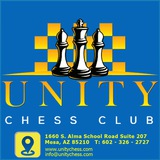18...exf5 19.e6 Rg8 20.exf7+ Kxf7 21.Bg2, with a strong attack.
18...Qc7 19.fxe6 Bxe6 (19...fxe6 20.Nf6+ Kd8 21.Nxd5 exd5 22.Qxd5+ Ke8 23.Bc4 Rf8 24.Rhf1+–) 20.Ng7+ Kd7 21.Nxe6 fxe6 22.Qxg4 Qc6 23.Bh3, with the initiative.
18...Qc7 19.fxe6 Bxe6 (19...fxe6 20.Nf6+ Kd8 21.Nxd5 exd5 22.Qxd5+ Ke8 23.Bc4 Rf8 24.Rhf1+–) 20.Ng7+ Kd7 21.Nxe6 fxe6 22.Qxg4 Qc6 23.Bh3, with the initiative.
Unity Chess Club
Vasily Smyslov Arnold Denker Moscow 1946 White to move
The d6-pawn is Black’s main problem. But to press on it conveniently, White needs to secure some space on the light squares, and this task is achieved by...
With the exchange of light-squared bishops, Black loses his last hopes of counterplay. White can put his rooks on d3 and d1, and Black can no longer hassle them with a bishop from f5 or g4. In another situation, Black could try to activate his position a little with ...b6-b5, but in this position, such a break is impossible.
25...Kh7 26.Bxe6 Qxe6 27.Rd3 Rc7 28.Rcd1 Rf7 29.Ne4 Bf8 30.Rd5 Qg4 31.R1d3
White gradually seizes space for his pieces – the rook on d5 assists the advance of the a-pawn, if White wishes.
This wins at once, so White is able to dispense with further manoeuvring and strengthening of his position. But now imagine that the d6-pawn was defended. In this case, White can strengthen his position with the moves Kg1-g2 and a2- a4. Later, depending on circumstances, he can play a4-a5, or advance the h-pawn with h2-h4, further restricting the black bishop, and creating the potential threat of h4-h5.
32...Bxd6 33.Rxd6 Rdf8 34.Qxe5 Rxf2 35.Rd7+ R8f7 36.Rxf7+ Rxf7 37.Rd8 Rg7 38.Qe8 g5 39.Qh8+ Kg6 40.Rd6+ Kf7 41.Qxh6 Qf5 42.Rd1 Qc5+ 43.Kg2 Qe7 44.Rf1+ Kg8 45.Qf6 Qe8 46.Qf5 g4 47.Rf2 Qe7 48.Qd3 Rg5 49.Re2 Qf8 50.Qe4 Rg7 51.Qd5+ Qf7 52.Re6 1-0
FIDE has launched an online chess museum where you can find handwritten notes of the most important matches, ancient chess sets and many other interesting things from the history of chess
https://museum.fide.com
https://museum.fide.com
